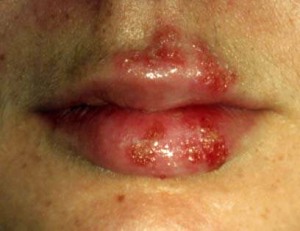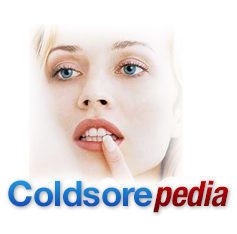 Herpes of the mouth, also known as cold sores or fever blisters, is an infectious disease usually caused by the virus Herpes Simplex type 1, although it can also be caused by Herpes Simplex type 2. The disease produces symptoms in outbreaks that follow a predictable course.
Herpes of the mouth, also known as cold sores or fever blisters, is an infectious disease usually caused by the virus Herpes Simplex type 1, although it can also be caused by Herpes Simplex type 2. The disease produces symptoms in outbreaks that follow a predictable course.
The outbreak begins with a burning or itching of infected skin, followed by inflammation and reddening. The skin forms blisters in clusters. The blisters burst, producing open sores that leak clear fluid. A scab-
Is It A Sexually Transmitted Disease (STD)?
Generally speaking, no, herpes of the mouth is not an STD. It is possible to become infected with cold sores by performing oral sex on someone who is suffering from the related illness of genital herpes. It is also possible to transmit the infection to someone’s genitals by performing oral sex on the person. However, in the sense of a disease that is only or normally transmitted by sexual contact, no, oral herpes
is not an STD. It is usually transmitted in other ways.
How Is It Transmitted?
Herpes simplex is transmitted when the virus infecting a sufferer comes in contact with a susceptible part of a healthy person’s body. This is much more likely to happen during an active outbreak, with the peak of infection chance during the open sore phase. However, it is possible to transmit the illness at any time, even during dormancy.
The illness is commonly transmitted by bodily contact, such as kissing. It can also be transmitted by secondary bodily contact. For example, a sufferer can touch the sores with his hand, shake hands with another person, and the other person can touch his face with that hand. During the open sore phase, virus-
Is It Curable?
No. There is no cure for herpes simplex. Once infected, you’ve got it for life. It won’t kill you, but you won’t kill it, either. The disease will spend most of its time in a dormant phase without causing any symptoms, but an outbreak can recur at any time. Treatments are available which can sometimes shorten the duration of an outbreak. These treatments usually consist of antiviral drugs, taken orally or used in topical application on the infected skin. However, these treatments do not constitute a cure.
Herpes And Children
In children over about one year of age, herpes has symptoms very similar to those it produces in adults. Infection of children is something to be avoided, but not a cause of great concern if it happens. Newborn babies are at greater risk for serious complications from herpes simplex infection, although not at increased risk for contracting the infection itself. For that reason, anyone suffering from an active outbreak of herpes should exercise precautions when caring for infants. A surgical mask and regular hand-
The greatest risk of newborn infection occurs from genital herpes rather than cold sores, and the risk is truly significant only at birth when the mother suffers from an active outbreak, especially when lesions form inside the vagina. Complications can include blindness, brain damage, and death. For this reason, active genital herpes lesions at the time of delivery are indications for a caesarian section.
